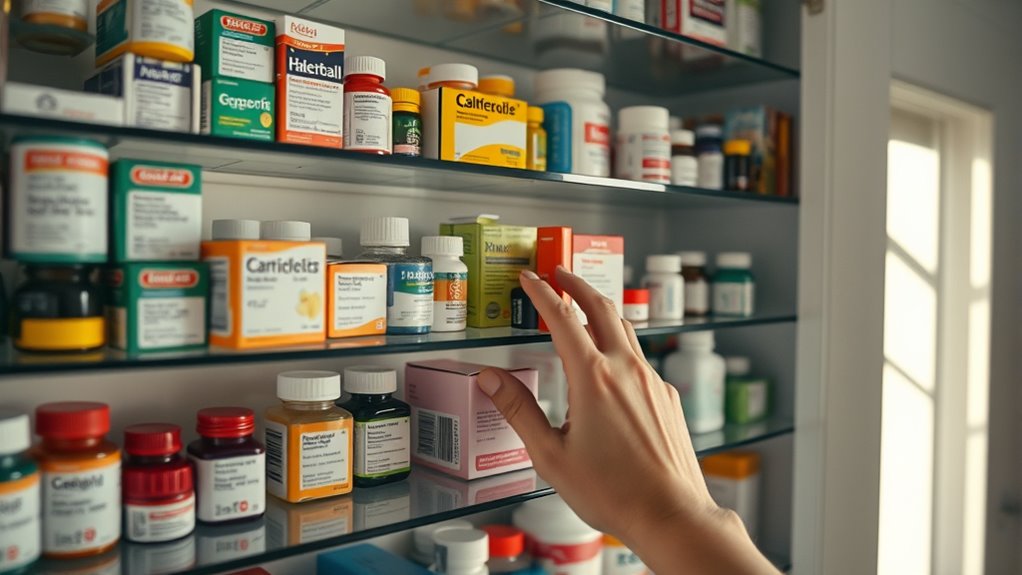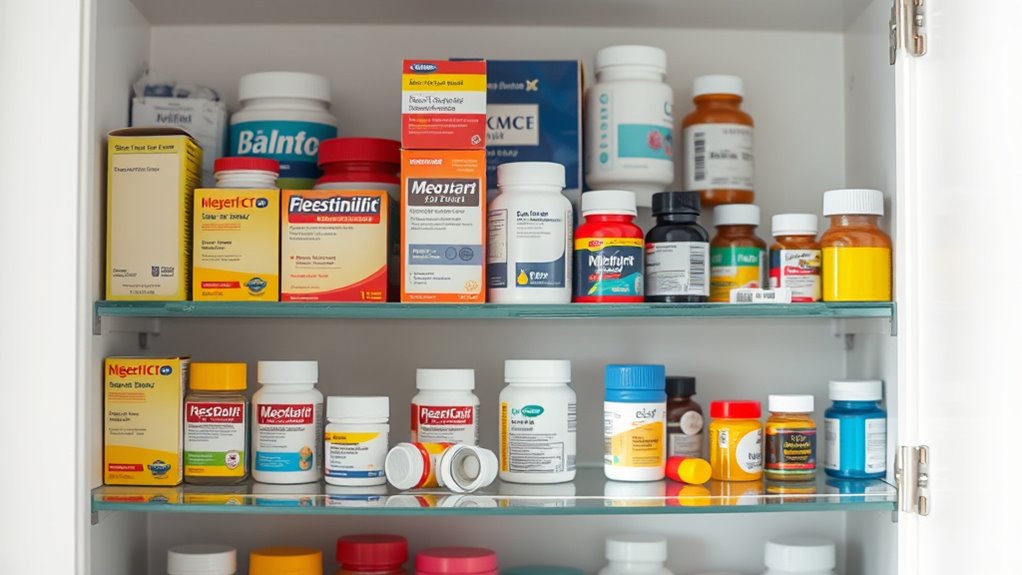As a caregiver, you need to understand how OTC medicines work, store them safely, and check for possible interactions with other medications, foods, or supplements. Always follow dosage instructions and keep a list of all medicines to prevent adverse effects. Proper storage and disposal are essential for safety. Staying informed helps you protect those in your care and ensures effective, safe treatment. If you continue exploring, you’ll discover practical tips to manage OTC medicines confidently.
Key Takeaways
- Understand how OTC medicines work and potential interactions with other drugs, foods, or supplements.
- Store medicines safely out of children’s reach and check expiration dates regularly.
- Follow dosage instructions carefully to prevent overdose or adverse effects.
- Keep a detailed list of all medications to avoid harmful interactions.
- Consult healthcare professionals before combining OTC medicines or if symptoms persist.

Over-the-counter medicines are available without a prescription, making them a convenient option for treating common health issues. As a caregiver, it’s essential to understand how these medicines work and how to use them safely. One of the most critical aspects is being aware of medication interactions. Even though OTC drugs are generally safe when used correctly, they can sometimes interact with other medications, supplements, or even certain foods. These interactions might reduce effectiveness or cause adverse side effects. For example, taking an analgesic alongside blood thinners can increase bleeding risk, so always check the labels or consult a healthcare professional if you’re unsure. Keeping a detailed list of all medications, including OTCs, helps you avoid dangerous interactions and guarantees safe treatment plans. Recognizing the importance of trust issues can also help caregivers stay attentive to potential problems that may arise from medication mismanagement or misunderstandings.
Proper storage tips are equally important to prevent accidental misuse or poisoning. Many OTC medicines should be stored out of reach and sight of children, ideally in a locked cabinet. Exposure to heat, humidity, or direct sunlight can compromise the potency of medicines, so store them in a cool, dry place. Always read the label for specific storage instructions, as some medications might require refrigeration or special handling. Regularly check expiration dates, and dispose of expired or unused medicines properly—many communities offer drug take-back programs. Proper storage not only preserves the medicine’s effectiveness but also minimizes the risk of accidental ingestion by children or pets.
In addition to storage, paying attention to dosage instructions on the package is essential. Overuse or incorrect dosing can lead to serious health issues, including toxicity. It’s tempting to give extra doses if symptoms persist, but that can be dangerous. Instead, follow the recommended dose and timing, and contact a healthcare provider if the condition doesn’t improve within the suggested timeframe. Reading labels carefully, including warnings and contraindications, is a simple but key step in maintaining safety.
Being a vigilant caregiver means staying informed about the medications in your household. Proper storage tips and awareness of medication interactions help you prevent common mistakes and guarantee the health and safety of those under your care. When used appropriately, OTC medicines can be a reliable tool for managing minor ailments, but always prioritize safety by staying organized and well-informed. If in doubt, don’t hesitate to seek advice from a healthcare professional to make sure you’re using these medicines correctly.
Frequently Asked Questions
Can Children Safely Use Adult OTC Medicines?
Children shouldn’t use adult OTC medicines without consulting a healthcare professional because it can jeopardize child safety. Adult medications often have different dosages and ingredients that may be unsafe or ineffective for children. Always check labels carefully and follow proper medication dosing instructions. To protect your child’s health, never give them adult OTC medicines unless explicitly advised by a doctor or pharmacist. Your vigilance helps ensure their safety and well-being.
How Should OTC Medicines Be Stored to Prevent Misuse?
Did you know that accidental poisonings from OTC medicines are responsible for nearly 60,000 emergency visits annually? To prevent misuse, always store medications in a secure location out of your child’s reach and sight. Use medication labeling carefully—ensure bottles are tightly closed and clearly labeled. Keep medicines in a locked cabinet or high shelf, and never leave them unattended. Proper storage protects your child and reduces the risk of accidental ingestion.
Are There Natural or Herbal OTC Remedies Available?
Yes, there are natural remedies and herbal supplements available over the counter. You can find options like herbal teas, supplements with echinacea, ginger, or turmeric that may help with common ailments. However, you should always check with a healthcare professional before giving herbal remedies, especially to children, as they can interact with other medications or have side effects. Always follow dosage instructions carefully to guarantee safety.
What Should I Do if My Child Overdoses on OTC Medication?
An overdose of OTC medication can be a parent’s worst nightmare, but swift action saves lives. If your child overdoses, immediately call emergency response and don’t wait. Stay calm, keep the medication container, and follow instructions from poison control. Do not try to induce vomiting or give food or water unless instructed. Quick, calm responses can make all the difference in managing a medication overdose effectively.
How Can I Tell if an OTC Medicine Is Expired?
To tell if an OTC medicine is expired, check the expiration date printed on the packaging, usually on the bottle or box. If the date has passed, the medicine may be less effective or unsafe. Remember that medicines have a limited shelf life, so even if it looks fine, it’s best not to use expired products. Always store medicines properly to maintain their efficacy and safety.
Conclusion
Remember, over-the-counter medicines can be helpful but also risky if misused. Always read labels carefully, follow dosing instructions, and consult a healthcare professional if you’re unsure. Don’t forget, even the most trusted remedies, like a vintage bottle of aspirin, can cause harm if not used properly. Be vigilant, stay informed, and treat every medication with respect—because your loved ones’ health depends on it. In this modern age, caution remains your best ally.









